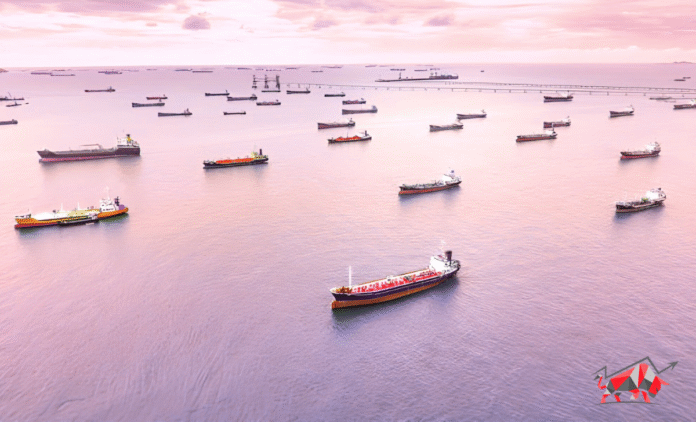The world’s largest publicly listed oil tanker company, Frontline, has announced that it is declining new contracts to sail through the Strait of Hormuz following Israel’s attack on Iran on Friday morning. This decision signals early and significant disruptions to international shipping routes as tensions escalate in the region.
Frontline’s Shipping Patterns Under Pressure
Frontline’s chief executive, Lars Barstad, confirmed that “extremely few” ship‑owners, including Frontline, are willing to accept charters to transit the Strait of Hormuz. He plainly stated: “We’re not contracting to go into the Gulf. That’s not happening now.” The Strait of Hormuz is a vital chokepoint—linking the Persian Gulf and Arabian Sea—and handles roughly one‑quarter of the world’s oil and one‑third of global liquefied natural gas (LNG) shipments. It also supports container vessels bound for Dubai’s major hub at Jebel Ali.
Barstad said Frontline would only permit vessels already stationed in the Gulf to depart by transiting Hormuz under tight security protocols, including escorted convoys backed by international naval forces. Still, he warned that “trade is going to become more inefficient and, of course, security has a price.”
Heightened Risks, Rising Insurance Costs
Maritime security experts backed Barstad’s position, pointing to growing fears about Tehran’s potential to disrupt shipping in the Strait. There is also concern that Iran could encourage Yemeni Houthi rebels to accelerate attacks in the Red Sea against international vessels.
An example of Iran’s past assertiveness came in April 2024 when the Islamic Revolutionary Guard Corps boarded the MSC Aries, a container ship with Israeli ownership links, near the Strait of Hormuz and redirected it to Iranian waters. Meanwhile, Houthi attacks since late 2023 have prompted shipping companies to reroute vessels away from the Suez Canal, around Africa via the Cape of Good Hope.
Insurance providers have already felt the strain. About 20% premium hikes for cargo shipping in the Red Sea reflect heightened exposure to drone and missile attacks and piracy. These increased risks follow recent strikes by Israel in the Houthi‑held port of Hodeidah in Yemen.
Container Lines on Edge, Port Congestion Looms
Companies that operate container vessels—critical for moving manufactured goods—are notably hesitant to return to normal routes through the Red Sea. Peter Sand, chief analyst at supply‑chain data firm Xeneta, warned that unless shipping firms resume using Jebel Ali as a regional hub, less-equipped alternative ports will suffer “inevitable disruption and port congestion.”
Sand also speculated that Iran might impose a “de facto closure” of the Strait of Hormuz. Despite this, Barstad assessed that a full shutdown was unlikely because Iran’s financial health depends heavily on oil revenue. “They have no interest in disrupting their own piggy bank,” he commented.
Iran’s Oil Output and the ‘Dark Fleet’
Barstad added that Iran may face difficulties maintaining its usual oil output following the Israeli strike. This situation might push major importers who typically rely on Iranian oil—such as China—to turn to other suppliers. That shift could benefit mainstream tanker operators like Frontline.
Iran has been exporting oil via a so‑called “dark fleet” of vessels that do not comply with global shipping norms, helping the country sidestep international sanctions. However, Barstad noted that legitimate buyers and shipping companies need “compliant” vessels and carriers to trade legally and ensure insurance coverage.
The Middle East War Could Redraw Maritime Trade Routes
While Frontline’s refusal to enter the Gulf is just one company’s stand, it represents a broader shift in risk appetite within global shipping. The balancing act of security, insurance, and efficiency is already tilting away from conflict zones. The fallout is clear: longer voyages around Africa, rising costs, and constrained trade flows.
Container shippers like Frontline, in particular, face a double hit—higher premiums and unpredictable transit times. If port congestion spreads to secondary hubs outside the Gulf, global supply chains could experience delays in everything from consumer electronics to clothing and raw materials. That, in turn, may feed into higher prices and pressure inflation that already brews in many economies worldwide.
Read More: Japan’s Inflation Surge Signals Trouble for BoJ and Ishiba Government
Looking ahead, Iran’s approach is key. If it maintains a light touch, shipping may reroute with calculated detours. But any escalation, or active use of proxies such as the Houthis, could force a more permanent re‑engineering of global marine corridors. That would benefit alternative tanker operators and port regions, but cost the world time and money.
Ultimately, this evolving crisis underlines a fundamental principle: when global chokepoints become flashpoints, supply chains fracture—and the financial burden rarely stays localized. The coming weeks will likely define whether these disruptions are temporary diversions or the start of a new maritime landscape.


